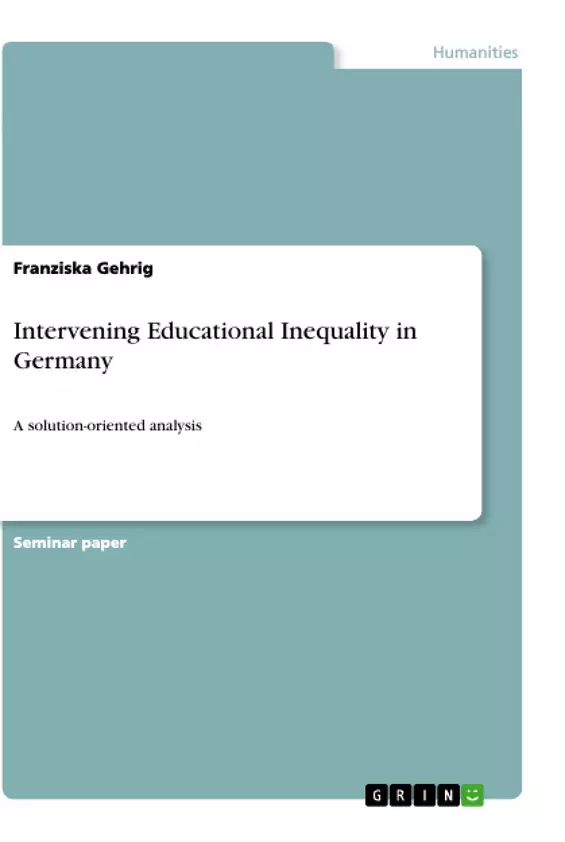Education produces and reprodues inequality. Germany still scores at the top in social inequality in the education system compared to other European countries. Differences in families’ given resources as unequally distributed starting conditions can, in principle, be compensated by schools. However, reality differs. Three main improvement areas are identified: schooling, kindergarten and school types/ tracking. These are based on an analysis of the determinants of educational success and inequality, the primary and secondary effects of social origin in the German education system. This paper focuses on pre-school, primary and secondary education and aims to find empirically based answers for inequalities and disadvantages. Five hypotheses are tested via reviewing studies and literature. The main findings are that summer schools have a significant effect on the performance of children and are able to reverse the phenomenon of performance fallback of low SES children and children with migration background – especially when German is their second language. Additionally, the usefulness of kindergarten, nurseries and KiTa’s for improving language skills of children with migration background and for overall compensating family resources is well known and acknowledged. Gesamtschulen show an impressionable impact on reducing secondary effects of social orgin. However, the most promising hypothesis to delay or abolish the (early) tracking lacks strong evidence and empirical data for Germany – no final conclusion can be drawn here.
Inhaltsverzeichnis (Table of Contents)
- Abstract
- 1. Akademiker- and Arbeiterkinder
- 2. Determinants of Educational Success and Inequality
- 2.1. Primary effects of social origin
- 2.1.1. Lack of schooling and varying family resources
- 2.1.2. Motivation and aspirations
- 2.2. Secondary effects of social origin
- 2.1. Primary effects of social origin
- 3. Intervention measures
- 3.1. Hypotheses
- 3.2. Effects of changing schooling
- 3.3. Effects of changing kindergarten
- 3.4. Effects of changing school types and tracking
- 4. Conclusive Thoughts
- 5. List of Reference
Zielsetzung und Themenschwerpunkte (Objectives and Key Themes)
This seminar paper investigates educational inequalities in Germany, aiming to identify key drivers of disadvantage and explore potential solutions. The paper focuses on pre-school, primary, and secondary education, analyzing the impact of social origin on educational success and exploring intervention measures.
- Impact of social origin on educational success and inequality in Germany
- Role of family resources and cultural capital in educational outcomes
- Effectiveness of intervention measures like summer schools, kindergarten, and Gesamtschulen
- Influence of school types and tracking on educational pathways
- Exploring the potential of education to compensate for social inequalities
Zusammenfassung der Kapitel (Chapter Summaries)
- 1. Akademiker- and Arbeiterkinder: This chapter introduces the significant disparity in educational outcomes between children of higher and lower socio-economic status (SES) in Germany. It highlights the correlation between parental education and school type attended by children, emphasizing the substantial regional differences in these disparities. The chapter concludes with a discussion of how the transition from primary to secondary school, with its various school systems, influences both academic and professional trajectories, further perpetuating social stratification.
- 2. Determinants of Educational Success and Inequality: This chapter delves into the factors influencing educational success and inequality in Germany, exploring both primary and secondary effects of social origin. It examines the role of family resources, motivation, and aspirations in shaping educational outcomes. The chapter also discusses the impact of social origin on student behavior, attitudes, and academic performance, highlighting how these secondary effects can reinforce initial inequalities.
- 3. Intervention measures: This chapter focuses on potential interventions to address educational inequality. It presents various hypotheses regarding the effectiveness of different measures, such as changing schooling structures, improving kindergarten access, and modifying school types and tracking systems. The chapter also explores the potential impact of each proposed solution on reducing educational disparities.
Schlüsselwörter (Keywords)
Educational inequality, social origin, family resources, cultural capital, school types, tracking, summer schools, kindergarten, Gesamtschulen, intervention measures, educational disadvantage, Germany.
Frequently Asked Questions
How does Germany rank in terms of educational inequality compared to other European countries?
Germany still scores at the top in social inequality within its education system compared to other European countries.
What are the "primary effects" of social origin in education?
Primary effects refer to the impact of unequally distributed family resources, cultural capital, and varying levels of motivation and aspirations on a child's academic performance.
Can summer schools help reduce educational disadvantage?
Yes, the paper finds that summer schools have a significant effect on performance and can reverse the fallback often seen in children from low socio-economic backgrounds or with migration backgrounds.
What role do "Gesamtschulen" play in addressing inequality?
Gesamtschulen show an impressionable impact on reducing the secondary effects of social origin, which relate to educational choices and transitions.
Is there strong evidence for abolishing early tracking in Germany?
While it is a promising hypothesis to delay or abolish early tracking, the paper concludes that there is currently a lack of strong evidence and empirical data specific to Germany to draw a final conclusion.
- Citation du texte
- Franziska Gehrig (Auteur), 2021, Intervening Educational Inequality in Germany, Munich, GRIN Verlag, https://www.grin.com/document/1029918



